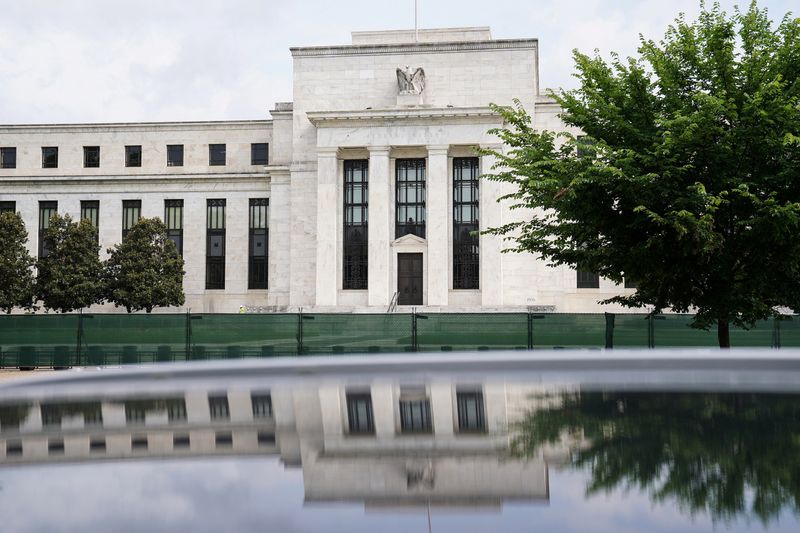By Yasin Ebrahim
Investing.com -- Federal Reserve policymakers were close to pausing rate hikes last month as the banking crisis unfolded, but high inflation and strong economic growth swayed their decision to pursue further monetary policy tightening, the minutes of Fed's March meeting showed on Wednesday.
"Several participants noted that, in their policy deliberations, they considered whether it would be appropriate to hold the target range steady at this [March] meeting," according to the minutes from the Fed's Mar. 21-22 meeting.
At the conclusion of its previous meeting on Mar. 22, the Federal Open Market Committee, or FOMC, raised its benchmark rate by 0.25% to a range of 4.75% to 5.00%.
The banking turmoil -- from the fallout from the collapse of Silicon Valley Bank and Signature Bank just as banking troubles were brewing abroad with Credit Suisse, which was eventually sold to UBS -- also soured the Fed's economic outlook as staff forecast a "mild recession" later this year.
Flagging the potential effects of the recent banking-sector developments, the Fed staff’s projection at the time of the March meeting "included a mild recession starting later this year," according to the minutes.
In the absence of the banking crisis that unfolded, however, a return to a steeper 50-basis-point rate hike was on the table after economic data pointed to persistent high inflation and strong economic growth.
"Some participants noted that given persistently high inflation and the strength of the recent economic data, they would have considered a 50 basis point increase in the target range to have been appropriate at this meeting in the absence of the recent developments in the banking sector," the minutes showed.
The Fed kept its benchmark rate forecast unchanged from December, forecasting a terminal rate, or peak rate, of 5.1% in 2023, suggesting at least one more hike to bring monetary policy to restrictive territory.
About 70% of traders expect the Fed to hike rates at its May 3 meeting, according to Investing.com’s Fed Rate Monitor Tool, with cuts also now expected before year-end.
At his March press conference, Fed Chairman Jerome Powell pushed back against a pivot, saying rate cuts weren’t Fed members’ “baseline expectations.” But the Fed chief also said that further tightening in lending conditions could be a substitute for rate hikes, sparking debate on Wall Street whether the Fed’s reaction function would be hijacked by the ebbs and flows of lending conditions.
The developments in the banking sector, the minutes shows, is playing a role in the Fed’s thinking on monetary policy, and swayed “many participants […] to lower their assessments of the federal funds rate target range that would be sufficiently restrictive."
Recent data so far shows that tightening of lending conditions has picked up pace following the banking crisis, which is showing signs of stabilizing.
“Overall, data on money market fund inflows, Fed lending and bank balance sheets show tentative signs of stabilization relative to a few weeks ago, but certainly do not give the ‘all-clear’ just yet,” Goldman Sachs said in a recent note.
